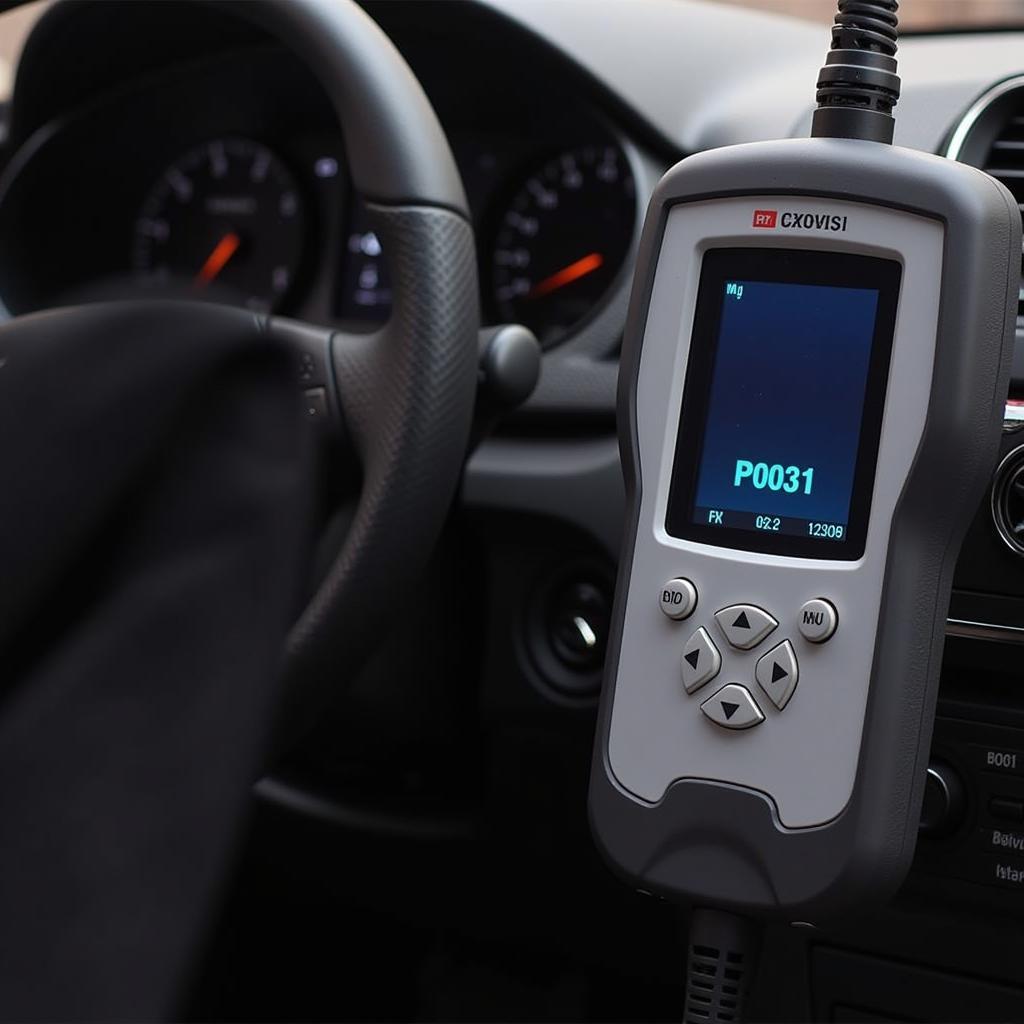Your cart is currently empty!

Understanding and Fixing the P0031 VW Code
The dreaded P0031 VW code can bring your Volkswagen to a screeching halt, leaving you stranded and frustrated. This article will dive deep into the P0031 code, explaining its causes, symptoms, diagnostic procedures, and solutions. We’ll empower you with the knowledge to tackle this issue head-on, whether you’re a seasoned mechanic or a DIY enthusiast.
The P0031 diagnostic trouble code specifically points to a problem with the heater circuit of the oxygen sensor located before the catalytic converter on bank 1. This sensor, also known as the air-fuel ratio (AFR) sensor, plays a vital role in maintaining the optimal air-fuel mixture for your engine’s combustion process. A properly functioning heater ensures the sensor reaches its operating temperature quickly, allowing for accurate readings and efficient engine performance. Ignoring this code can lead to decreased fuel economy, increased emissions, and potential damage to your catalytic converter.
What Causes the P0031 VW Code?
Several factors can trigger the P0031 code in your VW. Identifying the root cause is crucial for effective repair. Common culprits include:
- Faulty Oxygen Sensor: The most common cause is a malfunctioning oxygen sensor itself. Over time, the sensor can degrade due to exposure to high temperatures and exhaust gases.
- Damaged Wiring: Wiring issues, such as breaks, shorts, or corrosion in the sensor’s wiring harness, can disrupt the heater circuit.
- Blown Fuse: A blown fuse in the oxygen sensor heater circuit can cut off power to the heater.
- Faulty Heater Control Circuit: Problems within the engine control module (ECM) that controls the heater circuit can also trigger the P0031 code.
Recognizing the Symptoms of a P0031 Code
While the check engine light is the most obvious indicator, other symptoms can accompany the P0031 code:
- Decreased Fuel Economy: A malfunctioning oxygen sensor can lead to a richer air-fuel mixture, wasting fuel.
- Rough Idle: The engine may idle unevenly or stall.
- Hesitation or Stuttering During Acceleration: A faulty sensor can disrupt the engine’s performance, causing hesitation or stuttering.
- Increased Emissions: A richer air-fuel mixture can lead to increased emissions of pollutants.
Diagnosing and Fixing the P0031 VW Code
Diagnosing the P0031 code requires a systematic approach:
- Retrieve the Code: Use an OBD-II scanner to retrieve the stored trouble codes.
- Visually Inspect the Wiring: Carefully examine the oxygen sensor’s wiring harness for any signs of damage, such as breaks, shorts, or corrosion.
- Check the Fuse: Locate and inspect the fuse for the oxygen sensor heater circuit. Replace if necessary.
- Test the Oxygen Sensor: Use a multimeter to test the sensor’s heater circuit for resistance and voltage.
- Test the Heater Control Circuit: Verify the ECM is providing the correct voltage to the heater circuit.
[error code p0030 vw]
Once you’ve identified the cause, implement the appropriate repair:
- Replace the Oxygen Sensor: If the sensor is faulty, replacement is the most effective solution.
- Repair the Wiring: Repair or replace any damaged wiring in the sensor’s harness.
- Replace the Fuse: Replace a blown fuse with the correct amperage rating.
- Address ECM Issues: If the ECM is faulty, it may require repair or replacement.
 Using an OBD-II scanner to diagnose the P0031 VW code.
Using an OBD-II scanner to diagnose the P0031 VW code.
What happens if I ignore the p0031 vw code?
Ignoring the p0031 code can lead to further damage, reduced fuel efficiency and increased emissions. It’s best to address it promptly.
Where is the bank 1 sensor 1 oxygen sensor located on a VW?
The bank 1 sensor 1 oxygen sensor is typically located before the catalytic converter on the exhaust manifold of the engine cylinder bank containing cylinder number 1.
How much does it cost to fix the p0031 vw code?
The cost to fix the p0031 vw code can vary depending on the cause and the specific VW model. It can range from a simple fuse replacement to a more expensive oxygen sensor or ECM repair.
Can I drive my VW with a p0031 code?
While you might be able to drive for a short period, it’s recommended to address the issue as soon as possible to prevent further damage.
“A properly functioning oxygen sensor is crucial for optimal engine performance and fuel efficiency,” says John Smith, ASE Certified Master Technician. “Addressing the P0031 code promptly can prevent more costly repairs down the road.”
Conclusion
The P0031 VW code can be a nuisance, but understanding its causes, symptoms, and solutions can empower you to fix it effectively. By following the diagnostic procedures and implementing the appropriate repair, you can restore your VW’s performance and keep it running smoothly. Remember, addressing this code quickly can prevent further damage and save you money in the long run. Need assistance? Contact us at VCDSTool at +1 (641) 206-8880 and our email address: vcdstool@gmail.com or visit our office at 6719 W 70th Ave, Arvada, CO 80003, USA. We’re here to help you get back on the road.
by
Tags:
Leave a Reply